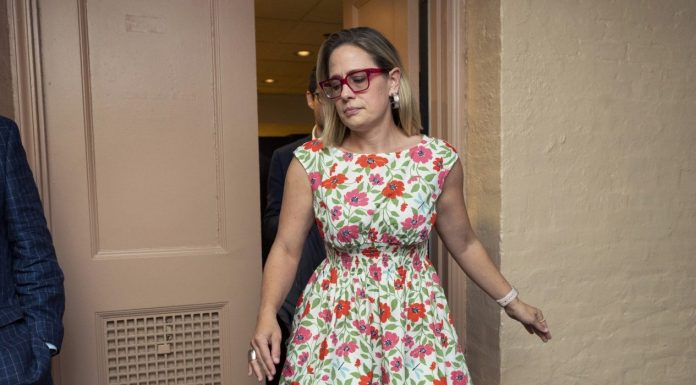(Headline USA) The Senate prepared to launch debate Tuesday on a radical voting overhaul with attention focused intently on two pivotal Democrats—Kyrsten Sinema of Arizona and Joe Manchin of West Virginia—who were singled out with a barrage of criticism from their own party on Martin Luther King Jr. Day
Leftist have racheted up their divisive and inflammatorry rhetoric as they seek to consolidate political power by any means necessary, even referring to a longstanding Senate tradition as the “Jim Crow filibuster.”
Martin Luther King III, the son of the late civil rights leader, brought disgrace upon his father’s legacy as a man of peace and virtue by wading deep into the partisan debate.
Although he prevously had supported voter ID—a key component of election integrity that Democrats wish to ban in order to facilitate vote fraud—the civil rights scion has since pivoted to an extreme position, unpopular with many in his own comminity.
He compared Sinema and Manchin to the white moderate his father wrote about during the civil rights battles of the 1950s and 1960s—a person who declared support for the goals of black voting rights but not the direct actions or demonstrations that ultimately led to passage of the landmark legislation.
“History will not remember them kindly,” the younger King said, referring to Sinema and Manchin by name.
This will be the fifth time the Democrat-led Senate will try to pass voting legislation this Congress.
With a 50-50 split, Democrats have a narrow Senate majority—Vice President Kamala Harris can break a tie—but they lack the 60 votes needed to overcome a filibuster.
President Joe Biden used the King holiday to pressure senators to do just that. But the push from the White House, including Biden’s rancorous and insulting speech last week in Atlanta comparing opponents to segregationists, is seen as too late, coming as the president ends his first year in office with his popularity sagging.
“It’s time for every elected official in America to make it clear where they stand,” Biden said on Martin Luther King Jr. Day. “It’s time for every American to stand up. Speak out, be heard. Where do you stand?”
Senate Republican leader Mitch McConnell, R-Ky., who is leading his party against the voting legislation has argued the legislation is a federal overreach into state-run elections, and he harshly criticized Biden’s speech last week as “unpresidential.”
The Senate is now launching what could become a weeklong debate, but the outcome is expected to be no different than past failed votes on the legislation.
Biden has been unable to persuade Sinema and Manchin to join other Democrats in changing the rules to lower the 60-vote threshold. In fact, Sinema upstaged the president last week, reiterating her opposition to the rules changes just before Biden arrived on Capitol Hill to court senators’ votes.
Senate Majority Leader Chuck Schumer, D-N.Y., had shelved a promised Monday rules-change vote that would have been linked to the King holiday. But he is pressing ahead Tuesday as advocates push to put senators on record, despite the expectation that no bill will pass by week’s end.
Schumer’s plan may well backfire if other embattled Democrats, seeing the unpopular position they are being forced into, also defect unexpectedly on the vote.
In all likelihood, however, most would likely prefer to maintain the appearance that they are rank-and-file party members, allowing the two centrists Democrats to do the dirty work while faceing down harassment from left-wing activists.
Senators have been working nonstop for weeks on rules changes that could win support from Sinema and Manchin, only to see their efforts repeatedly dashed.
Both Manchin and Sinema have argued that preserving the Senate filibuster rules as they are, at the 60-vote threshold to advance legislation, is important for fostering bipartisanship. They also warn of what would happen if Republicans win back majority control, as is distinctly possible this election year, and could easily pass GOP-backed bills.
During the first two years of former President Donald Trump’s term, when the GOP controlled both chambers of Congress, Democrats were vocal about their staunch support for the filibuster, and were joined by a number of Republicans in drafting a letter that affirmed it.
However, many of them have now backpedaled on their former grandstanding when faced with the oppotunity to boost Democrats’ ability to commit vote fraud.
Sinema came under particularly fierce criticism on social media for invoking King as well as the late Rep. John Lewis, whose name is on the legislation.
“We cannot think of a time more defining to the American story than the chapter you are presently writing,” NAACP President and CEO Derrick Johnson wrote in an open letter to the Senate.
“What country will your children and grandchildren be left with, given the relentless assaults on American freedom and democracy?”
Manchin spokeswoman Sam Runyon said in a statement late Monday: “Senator Manchin believes strongly that every American citizen of legal age has not only the right, but also the responsibility to vote and that right must be protected by law. He continues to work on legislation to protect this right.”
Sinema’s office did not respond to a request for comment.
The voting bill was the Democrats’ top priority this Congress, and the House swiftly approved H.R. 1 only to see it languish in the Senate.
Originally dubbed the “For the People” Act, it has been rebranded regularly with each failure.
Now called the Freedom to Vote: John R. Lewis Act, the package before the Senate includes some of the most sweeping changes to elections in a generation, including support for ballot-harvesting and universal mail-in ballots.
The package is coupled with the John R. Lewis Voting Advancement Act, which would force many red-leaning states arbitrarily to seek permission from the partisan Justice Department before making any changes to voting laws. A similar measure was struck down several years ago by the US Supreme Court.
Adapted from reporting by the Associated Press

